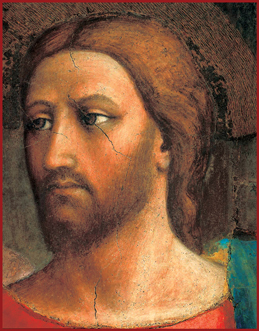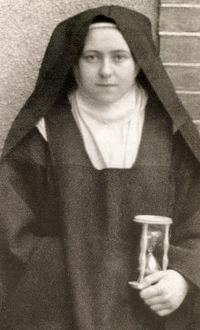When the Kingdom of God Comes Nigh

Isaiah 66:10 – 14
Galatians 6:14 – 18
Luke 10:1 – 20
Joy and Thanksgiving
Today’s Holy Mass invites us to joy and to thanksgiving: an invitation that we need to hear again and again. In the Collect we asked for nothing less than “a holy gladness” in view of “joys that will never end.”
O God, who by the abasement of your Son
have lifted up a fallen world;
grant to your faithful a holy gladness,
so that having delivered us out of the servitude of sin,
you may give us to taste fully of joys that never end.
As the Word of God unfolded, it revealed the reasons for our joy, and quickened our thanksgiving.
Reasons for Our Joy
Joy, because the Mercy of God descends upon us here and now.
Joy, because God promises us a river of peace and an overflowing torrent of glory.
Joy, because God promises to comfort us as a mother caresses her little child.
Joy, because of the saving wood of the glorious Cross.
Joy, because Our Lord sends forth His own to heal the sick
and to proclaim that the Kingdom of God is nigh.
A Quickening of Gratitude
It is joys such as these that cause thanksgiving to spring up. In a heart touched by divine joy there is no room for self-pity; there is, instead, a quickening of gratitude, a need to say to God, “I thank Thee, O God, with all my heart, for all that Thou hast permitted and ordained.”
Mercy From Above
The Introit — the very one we sing on February 2nd, the Presentation of the Lord — set the tone: “We have received Thy mercy, O God, in the midst of Thy temple. According to Thy name, O God, so also is Thy praise unto the ends of the earth: Thy right hand is full of justice” ({s 47:10-11). So often as we assemble in Christ, that is, in His Body, the new and abiding Temple of “adoration in spirit and in truth” (Jn 4:24), mercy descends from above. The mercy of God falls over us “like the precious ointment on the head, that ran down upon the beard, the beard of Aaron, which ran down to the skirt of his garment: as the dew of Hermon, which descendeth upon Mount Sion.”
Healing Love
Mercy, descending like a precious ointment from above, has at least two effects on the members of the Body of Christ. The first is that it bathes us in the healing love of God. Mercy is the form assumed by Love in the face of suffering.
Dilated Hearts
The second effect of the precious anointment of Mercy is that it softens our hearts. Yesterday, in his personal introduction to the Motu Proprio Summorum Pontificium, the Holy Father said:
I think of a sentence in the Second Letter to the Corinthians, where Paul writes: “Our mouth is open to you, Corinthians; our heart is wide. You are not restricted by us, but you are restricted in your own affections. In return … widen your hearts also!” (2 Cor 6:11-13). Paul was certainly speaking in another context, but his exhortation can and must touch us too, precisely on this subject. Let us generously open our hearts and make room for everything that the faith itself allows.
Souls untouched by the precious ointment of Mercy remain hard and closed. Souls bathed in the precious ointment of Mercy are supple, open, and wide in their affections.
 From the Rising of the Sun to Its Setting
From the Rising of the Sun to Its Setting
The Introit also says that the praise of God — thanksgiving — goes wherever goes His Name. His praise reaches to the ends of the earth, and this because the Holy Sacrifice of the Mass is offered in every place on earth, “from the rising of the sun even to the going down” (Mal 1:11).
The Storm of Glory
The passage we heard from the prophet Isaiah is familiar to us. Not only is it the source of the magnificent Introit of the Fourth Sunday of Lent, Laetare; it is also the First Reading on the feast of Saint Thérèse of the Child Jesus and of the Holy Face.
The Promises of God
In Isaiah 66:12-14, God makes a series of amazing promises:
1. “Behold I will bring upon her as it were a river of peace, and as an overflowing torrent the glory of the Gentiles.
2. You shall be carried at the breasts, and upon the knees they shall caress you.
3. As one whom the mother caresseth, so will I comfort you, and you shall be comforted in Jerusalem.
4. You shall see and your heart shall rejoice, and your bones shall flourish like an herb.
5. And the hand of the Lord shall be known to his servants.
If we really believed these enduring promises of God, our joy would be unassailable and our thanksgiving ceaseless or, as the Preface of the Mass says, semper et ubique, always and everywhere. Where and how are these promises fulfilled? In the Mass and through the Mass. The Mass is the descent of every “grace and heavenly blessing” (Roman Canon). The Mass is the ascent of our thanksgiving to the Father, through the Son, in the Holy Spirit.
Death and Life
Writing to the Galatians, Saint Paul describes himself as a man for whom the world is crucified — that means dead — and as a man crucified to the world. That also means dead. The Apostle was a man dead to a world that was dead to him. (This is, as well, the description of a perfect monk, one, configured to Jesus Crucified. The liturgy uses this very text for the Introit of the feast of Saint Francis of Assisi!) Because he is dead in this way, Paul is a “new creature.” Saint Paul makes it clear that for one who dies by adhesion to the mystery of the Cross, even as he died while yet alive, there will be peace, and mercy, and grace. And where there are these things, there will be joy and, yes, thanksgiving.
The Mission
The Holy Gospel relates the sending forth of the seventy-two disciples before the Face of the Lord. In essence, Our Lord tells them not to waste time and not to squander their energy. He wants them to be about the mission and nothing else. They are to announce the Kingdom of God and give evidence of its coming. How are they to do this? Our Lord says, “Heal the sick that are therein, and say to them, ‘The kingdom of God has come nigh unto you’” (Lk 10:9). If people do welcome you, He says, or refuse to listen to your message, waste no time among them. “Into whatsoever city you enter, and they receive you not, going forth into the streets thereof, say: ‘Even the very dust of your city that cleaveth to us, we wipe off against you’” (Lk 10:10-11).
Evidence of the Kingdom in County Mayo

In Ireland this past week I had at least two very concrete experiences of what happens when a priest obeys this missionary mandate of the Lord to heal the sick and proclaim the Kingdom of God. I was standing in the rain in Knock in County Mayo in the West of Ireland, when a robust young man, the father of ten children, approached me. “Father,” he said,” would you bless me, and my family. I just lost my fourteen year old boy — stabbed by a seventeen year old lad in the street. Michael had gone out for a bag of chips and never came home. Murdered, he was, with a knife in his heart.”
They came to me one after the other: the father of Michael Doherty, his mother, his siblings, uncles, and aunts. I later learned that they were Irish Travellers. Their faith in the healing power of the blessing of a priest was extraordinary. And so, there I stood, right in the middle of the street, laying hands on them, and blessing. And, out of their tragedy and grief, there came joy and thanksgiving.
Joy in County Leitrim
The second incident took place at Saint Patrick’s Hospital, a day care centre for the elderly and chronically ill in Carrick-on-Shannon in County Leitrim. My Dad’s cousin John McKeon goes there every day for Mass, breakfast, a hot lunch, activities, and a lovely tea before being dropped at his cottage by a special bus for the elderly. After Mass, John asked me to bless a lady suffering from cancer. I laid hands on her and prayed for her through the intercession of Our Lady of Knock. Afterwards, I looked into her eyes only to see — what? — tears of joy and of thanksgiving. It didn’t end there. People queued up, a great number of them, asking for a blessing and a prayer — each one seeking, in effect for evidence of the nearness of the Kingdom of God. I laid hands on them and prayed for each one. The Kingdom of God came nigh. There was joy. And there was thanksgiving.
Gratitude in All Things
That special gift that came to me, first during my confession at Knock Shrine, and then at a parlour with the wise old abbess of the monastery of Drumshanbo, was a clear mandate to live in thanksgiving. Both the elderly priest at Knock and the discerning old abbess spoke to me on the part of God, saying in essence, “Be grateful for all things without exception. Never stop thanking God. Let thanksgiving be your prayer.” There is no escaping it: where there is joy, there will be thanksgiving; and where there is thanksgiving, there will be joy. Pondering the “word” given me, I began to pray, “I thank Thee, O God, for all that Thou hast permitted or ordained in my life from my conception even to the present moment.”
Give Thanks
If you are gloomy and pessimistic, critical and sad, begin to give thanks, and all of that will be turned into joy. Be converted to thanksgiving semper et ubique, and joy will triumph over everything else.
Enter now into the Great Thanksgiving, the Sacrifice of Christ, the wellspring of Eucharistic joy. And know, beyond any doubt, that God is faithful to His promises and that the Kingdom of God comes nigh in the adorable mysteries of the Body and Blood of Our Lord Jesus Christ.

Father, I love hearing stories of faithfulness from Ireland. My mom is a good, devout woman who left Ireland when it was still very devout, and it was sad when I lived there for a short time to see what the Irish had lost in their efforts to be “world players.” It gladdens our hearts when we hear stories like yours. Thank you!